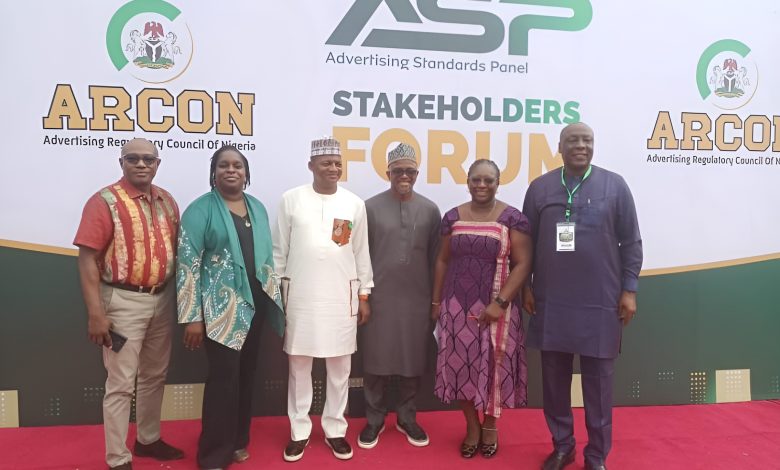ARCON Reaffirms Commitment to Ethical Advertising as Stakeholders Call for Agile Regulation and Self-Regulation


By Azeez Disu
The Advertising Regulatory Council of Nigeria (ARCON) has restated its commitment to ethical advertising and regulations that will accelerate the growth of the advertising industry. This was announced during the Advertising Standards Panel (ASP) Stakeholders Forum, where participants also called for agile regulation and self-regulation.
The event, held recently in Lagos, brought together industry leaders, regulators, and legal experts to address the escalating challenges of ethical advertising, particularly in the rapidly evolving digital landscape. The forum underscored ARCON’s enhanced mandate and its commitment to sanitizing the Nigerian advertising ecosystem.
In his welcome address, the Director-General of ARCON, Dr. Lekan Fadolapo, highlighted the significant shifts within the advertising industry and emphasized that the forum was intended to engage stakeholders and strengthen regulations. He stated that the digital space poses numerous challenges, including a high rate of unethical advertising practices.
He cited alarming examples of unethical advertising that have plagued the market, including “an ad by a pastor, AI-generated advertising for prostate cancer drugs,” and pervasive “ads for financial services offering numerous discounts or claims that cannot be substantiated” on platforms like TikTok. Dr. Fadolapo also recounted a case where a property company used celebrities to sell land, only for the celebrities to later disassociate themselves due to fraudulent practices, leading to oversaturated subscriptions. The financial toll of these unwholesome advertisements is staggering, with an estimated “1.3 trillion naira” lost from the economy through scams.
Dr. Emmanuel Agu, Chairman of the ASP, stated that the ASP, a statutory organ of ARCON, plays a “pivotal role in pre-vetting and approving advertisements before they are released to the public.” He described the ASP as “the final gatekeeper, ensuring that every advertisement is legal, honest, culturally appropriate, socially responsible, and verifiable.”
He highlighted specific areas of focus during vetting that brands and agencies need to be concerned about, such as “truthfulness and substantiation of claims,” avoidance of “offensive or discriminatory material,” and strict compliance with laws related to health, finance, food, and drugs. He also emphasized the requirement for prices to be displayed in “Nigerian currency (Naira),” and noted that “models used in advertisements must be Nigerians, except where the concept requires non-Nigerians, in which case a waiver is obtained from the DG of ARCON after due payment.” Violations screened against include “false or misleading claims, offensive or indecent imagery, discrimination or hate speech, unsubstantiated medical or health claims, [and] unauthorized use of trademarks or personalities.” Non-compliance can lead to severe penalties, including “withdrawal or ban of the advertisement, fines and sanctions on advertisers and agencies, [and] suspension of licenses or operating permits.”
Similarly, Joe-Eugene Onuorah, ARCON’s Director of Regulations, reiterated that the ARCON Act mandates all advertisements targeting the Nigerian market to receive “prior approval from the Advertising Standards Panel.” Only duly registered and bona fide advertising practitioners are qualified to submit vetting applications.
He stressed that the ASP is committed to protecting consumers, competitors, and the public from “deceptive or misleading messaging, offensive or insensitive communication, disparaging campaigns, or unfair attacks on competing brands.”
Barr. Charles S. Odenigbo, Director-General of the Centre for Media Studies (CMS), underscored the Federal Government’s seriousness in curbing “the dangers that unwholesome and unethical advertisements pose to the Nigerian public” by establishing “the Advertising Offences Tribunal to try all criminal matters related to advertising throughout the federation.” He also noted that the creation of other bodies, such as the Governing Council, Advertising Practitioners Disciplinary Committee, Advertising Practitioners Investigative Panel, and the ASP, ensures the seamless functioning of ARCON’s organs. A powerful message from his address was, “Ignorance of the law is not an excuse!”
According to Lanre Adisa, Chairman of the Heads of Advertising Sectorial Group (HASG), stakeholders expect ARCON to develop a “dynamic, forward-looking regulatory framework” with “clear, distinct, and agile digital guidelines,” different from traditional media. He called for the adoption of “co-regulation models with platforms and agencies” and emphasized “equal enforcement for all players,” ensuring that global platforms are subject to the same rules as local players. He also advocated for “collaborative industry engagement” to update the Advertising Code and establish a Digital Advertising Council. Furthermore, he recommended investing in “Regulatory Technology (RegTech)” such as “automated vetting portals” and “AI-assisted content classification” to enhance transparency and reduce bottlenecks.
Looking ahead, Mr. Adisa expressed a vision for Nigerian advertising to “embrace self-regulation in the near future,” citing countries like the UK, USA, and South Africa as examples. He suggested this would require sectoral bodies to “enforce their codes of conduct among their members” and for a strengthened ASP to address breaches. While acknowledging that “we missed an opportunity to self-regulate online due to the abuse of the space by a few brands,” he maintained that “it’s never too late.” He believes that self-regulation would demand “a higher sense of responsibility from agencies and lead to a raising of standards.”


